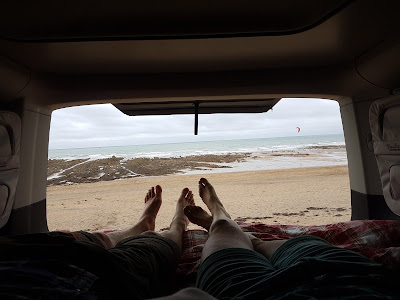Time and tide waits for no man, woman or child.
 This weekend we're expecting some huge surf on Cornwall's north coast. So, in case you were thinking about going storm watching, take a moment to read this. It's about how tides work. Just in case you didn't know and thought that it might be a good idea to head out to the beach...
This weekend we're expecting some huge surf on Cornwall's north coast. So, in case you were thinking about going storm watching, take a moment to read this. It's about how tides work. Just in case you didn't know and thought that it might be a good idea to head out to the beach...
Whatever you intend to do at the coast – storm watching, foraging,
beach combing, taking part in a beach clean, surfing or just having a lazy day
out – it’s vital to understand just a little about it. If you don’t, you can unwittingly
get into all sorts of trouble. Whilst it might sound like fun to get a lift
home in a helicopter or on a lifeboat it really isn’t. And it can cost a lot
more than cold hard cash.
UNDERSTANDING TIDES: PAGE 1
Understanding what the tide is doing, where it’s going and
how it works is the first line of the first paragraph of the first page in the big
book of hanging out at the seaside. Some people are surprised that they are different
every day. They visit one week and find the tide in and then come back a week
later to find the sea gone. No, really. Of course we wouldn’t think such
nonsense! But would we?
TIDES CHANGE EVERY DAY! REALLY?
High and low tide times change every day – and with every
location – so it’s always a good idea to get a copy of a local tide table.
Usually the tides advance by about 30 minutes per tide on a six hour cycle.
That means that if high tide is at ten o’clock in the morning on one day, the
following high tide will be about half past ten in the evening and the next
tide (the following day) will be at about eleven-ish. Of course it’s slightly
different everywhere so consult your tide table.
The tide, like the moon which governs them, has phases. Full
moon, new moon, waxing, waning. And so on and so forth. So it stands to reason
that tides, seeing as they are a result of the moon’s gravitational pull on the
earth, will follow that pattern.
SPRING TIDES
During full and new moons - actually just after - we
experience spring tides. This is when the tidal range is greatest and the sea
comes in further up the beach and goes out further than at any time (a good time to go foraging for mussel). In times of big storms and heavy sea these are the tides that do the most damage because they wash further up the beach than any other and have the additional push of the wind behind them.
Spring tides come in and go out quicker than at any other time because there is further to travel and the same amount of time to do it in. In some places, where the beaches are very flat, the tide can really rush in. Whether or not the tide could ‘overtake a galloping horse’ (as the stories go) in these places is not for me to say as I have never tested it out (no horse).
NEAP TIDES
Neap tides
- during the first and third quarter in moon terms - are those that have the
smallest tidal range. That means that they don't come in as far and don't go out as far as spring tides. This means that you could find yourself walking along a
beach at high tide one week and the next week, at high tide, the beach could be
completely covered with water. Assuming you are safe from the tide ‘because
that’s where it comes up to’ could easily lead you to think you won’t get cut
off. If you’re in some far flung cove you could.
WIND EFFECT ON TIDES
The wind can also have an effect on the tides. Onshore winds can effectively push a tide in quicker and make it come further up the beach. It may not be by much but it can make a big difference if you are storm watching and assume that your position is safe. With strong onshore winds even neap tides like those we are going to experience this weekend, can travel farther up the beach than they normally might.
WALKING ON LOW TIDE SANDS
If you intend to walk along low tide sands then it's always vital to check your tide table and then leave well before low tide and make the furthest part of your walk coincide with an hour or so before low tide so that you won't be caught out on the way back. Don't leave it too late to get back. And always keep in mind a get out clause (emergency route out) if you get caught out.



Comments
Post a Comment